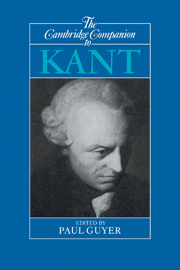Book contents
- Frontmatter
- Introduction
- 1 Kant's intellectual development
- 2 The Transcendental Aesthetic
- 3 Functions of thought and the synthesis of intuitions
- 4 The transcendental deduction of the categories
- 5 Causal laws and the foundations of natural science
- 6 Empirical, rational, and transcendental psychology
- 7 Reason and the practice of science
- 8 The critique of metaphysics
- 9 Vindicating reason
- 10 Autonomy, obligation, and virtue
- 11 Politics, freedom, and order
- 12 Taste, sublimity, and genius
- 13 Rational theology, moral faith, and religion
- 14 The first twenty years of critique
- Bibliography
- Index
10 - Autonomy, obligation, and virtue
An overview of Kant's moral philosophy
Published online by Cambridge University Press: 28 May 2006
- Frontmatter
- Introduction
- 1 Kant's intellectual development
- 2 The Transcendental Aesthetic
- 3 Functions of thought and the synthesis of intuitions
- 4 The transcendental deduction of the categories
- 5 Causal laws and the foundations of natural science
- 6 Empirical, rational, and transcendental psychology
- 7 Reason and the practice of science
- 8 The critique of metaphysics
- 9 Vindicating reason
- 10 Autonomy, obligation, and virtue
- 11 Politics, freedom, and order
- 12 Taste, sublimity, and genius
- 13 Rational theology, moral faith, and religion
- 14 The first twenty years of critique
- Bibliography
- Index
Summary
Kant invented a new way of understanding morality and ourselves as moral agents. The originality and profundity of his moral philosophy have long been recognized. It was widely discussed during his own lifetime, and there has been an almost continuous stream of explanation and criticism of it ever since. Its importance has not diminished with time. The quality and variety of current defenses and developments of his basic outlook and the sophistication and range of criticism of it give it a central place in contemporary ethics. In the present essay I offer a general survey of the main features of Kant's moral philosophy. Many different interpretations of it have been given, and his published works show that his views changed in important ways. Nonetheless there is a distinctive Kantian position about morality, and most commentators are agreed on its main outlines.
- Type
- Chapter
- Information
- The Cambridge Companion to Kant , pp. 309 - 341Publisher: Cambridge University PressPrint publication year: 1992
- 22
- Cited by

